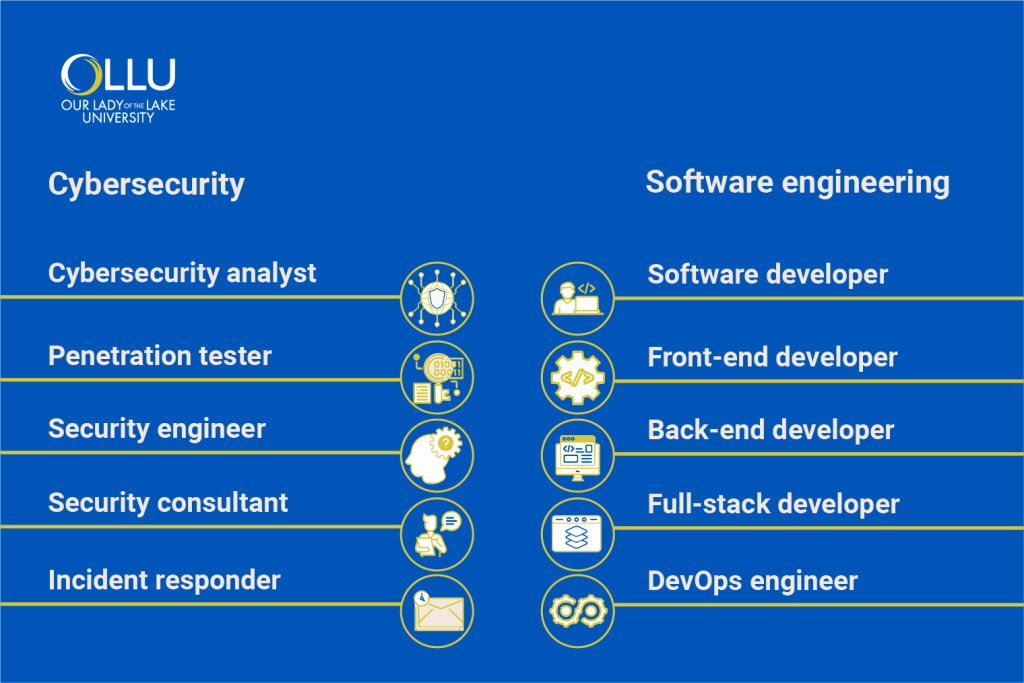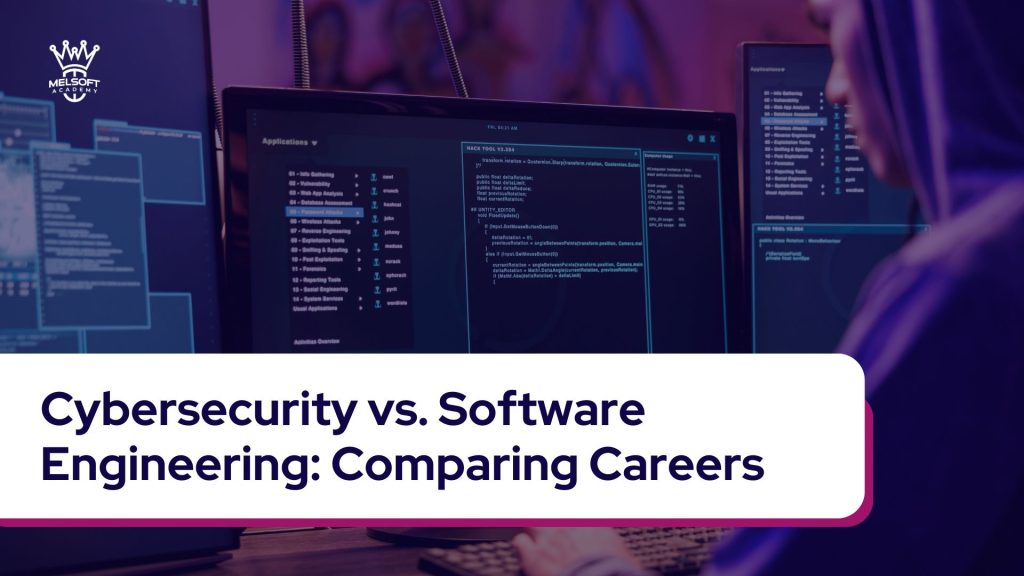Choosing a career path can be daunting, especially in rapidly evolving fields like cybersecurity and software engineering. Both offer exciting opportunities, strong salaries, and the chance to make a real impact, but they cater to different skill sets and interests. This in-depth comparison from Melsoft Academy will help you understand the key differences between these two rewarding career paths and determine which might be the better fit for you.
What Is the Main Difference?
At their core, cybersecurity and software engineering address different sides of the same coin. Software engineering focuses on building secure and functional software systems. Cybersecurity professionals, on the other hand, focus on protecting those systems and the data they handle from threats. Software engineers are the architects and builders; cybersecurity experts are the guardians and defenders.
While there’s overlap—a strong software engineer will incorporate security best practices into their code—their primary responsibilities diverge significantly. Software engineers are concerned with functionality, performance, scalability, and user experience. Cybersecurity professionals are concerned with vulnerabilities, threats, attacks, risk mitigation, and incident response. Think of it this way: software engineers create the digital world; cybersecurity experts secure it.
Cybersecurity vs. Software Engineering Career Paths

Both fields offer a wide range of career paths, each with its own specializations and levels of seniority.
Software Engineering Career Paths: A junior software engineer typically starts by working on smaller components of larger projects under the guidance of senior engineers. As they gain experience, they can specialize in areas like front-end development (user interfaces), back-end development (server-side logic and databases), mobile development, game development, DevOps (managing software development and deployment), or data science.
Senior roles often involve leading teams, architecting complex systems, and mentoring junior engineers. Further advancement can lead to roles like Chief Technology Officer (CTO) or similar leadership positions.
Cybersecurity Career Paths: A cybersecurity career might begin with entry-level roles like security analyst, where professionals monitor systems for threats, respond to security incidents, and perform vulnerability assessments. With experience, they can specialize in areas like penetration testing (ethically hacking systems to identify vulnerabilities), incident response (handling security breaches), security architecture (designing secure systems), cryptography (developing and implementing secure communication methods), cloud security, or digital forensics (investigating cybercrimes).
Senior roles often involve managing security teams, developing security policies, and advising organizations on risk management. Top-level positions include Chief Information Security Officer (CISO).
How To Get a Job
Securing a job in either field requires a combination of education, skills, and experience.
Software Engineer Requirements
The typical path to becoming a software engineer involves obtaining a bachelor’s degree in computer science, software engineering, or a related field. However, many successful software engineers have learned through self-study, online courses, bootcamps, or a combination of these methods. Regardless of the educational path, strong programming skills in languages like Java, Python, C++, or JavaScript are essential. Familiarity with databases, software development methodologies (Agile, Waterfall), and version control systems (Git) is also highly valuable. A strong portfolio showcasing completed projects is crucial for demonstrating practical skills to potential employers. Internships and personal projects are excellent ways to build experience and enhance a resume.
Cybersecurity Expert Requirements
A background in computer science or a related field is beneficial for cybersecurity professionals, but it’s not always mandatory. Many cybersecurity professionals come from diverse backgrounds, including networking, information systems, or even law enforcement. Certifications like CompTIA Security+, Certified Ethical Hacker (CEH), Certified Information Systems Security Professional (CISSP), or Offensive Security Certified Professional (OSCP) are highly valued and demonstrate a commitment to the field. Practical experience through internships, capture-the-flag (CTF) competitions, or personal projects is crucial. Understanding networking concepts, operating systems, and security protocols is essential. Strong problem-solving and analytical skills are vital for identifying and resolving security issues.
Should You Go Into Software Engineering or Cybersecurity?
The “better” career path depends entirely on your individual skills, interests, and goals.
Choose Software Engineering if:
- You enjoy building things and solving complex problems through creative coding.
- You’re comfortable with intricate details and enjoy the process of designing and implementing functional systems.
- You’re fascinated by the inner workings of software and how it interacts with hardware.
- You prefer a more structured and process-oriented approach to problem-solving.
Choose Cybersecurity if:
- You enjoy investigating and solving puzzles, particularly those involving security breaches and vulnerabilities.
- You’re fascinated by the adversarial nature of cybersecurity and the constant arms race between attackers and defenders.
- You have a strong analytical mind and enjoy identifying patterns and anomalies.
- You’re comfortable working under pressure and responding to urgent situations.
- You’re passionate about protecting sensitive information and ensuring the safety and security of digital systems.
Both fields offer significant opportunities for growth and high earning potential. The demand for skilled professionals in both areas is consistently strong and shows no signs of slowing down in the foreseeable future. Consider your strengths, passions, and long-term career aspirations when making your decision. Research specific roles within each field to gain a better understanding of the day-to-day responsibilities and required skills. Networking with professionals in both cybersecurity and software engineering can provide valuable insights and guidance.
Cybersecurity vs. Software Engineering FAQs
Q: Which field pays more?
A: Salaries in both fields are competitive and vary based on experience, location, and specialization. Generally, highly experienced professionals in both cybersecurity and software engineering command high salaries. Specific salary figures can be found through online resources like Glassdoor or Salary.com.
Q: Which field is more stressful?
A: Both fields can be stressful, but in different ways. Software engineering can involve tight deadlines, complex projects, and the pressure to deliver high-quality code. Cybersecurity can be stressful due to the urgency of responding to security incidents, the constant threat of new attacks, and the potential consequences of security failures.
Q: Which field requires more creativity?
A: Both fields require creativity, but in different ways. Software engineering requires creative problem-solving to design and implement efficient and user-friendly systems. Cybersecurity requires creativity to anticipate and counteract the ever-evolving tactics of attackers.
Q: Can I switch between these fields later in my career?
A: Yes, it’s possible to transition between cybersecurity and software engineering later in your career. Many skills are transferable between the two fields, and experience in one area can be valuable in the other. For example, a strong software engineer can leverage their coding skills to become a penetration tester, while a cybersecurity expert can apply their security knowledge to develop more secure software. However, additional training or certifications might be necessary to make a successful transition.
Ultimately, the best career path for you depends on your individual preferences and aspirations. By carefully considering the differences between cybersecurity and software engineering and assessing your own skills and interests, you can make an informed decision that sets you on the path to a fulfilling and successful career. Melsoft Academy offers a range of courses and resources to help you develop the skills you need to excel in either field. Contact us today to learn more about our programs and how we can help you achieve your career goals.
Download our prospectus: Download Prospectus
About Melsoft Academy: Learn More
Apply Now: Apply Here
Apply to the Manati Alternate Student Funding: Apply for Fund


